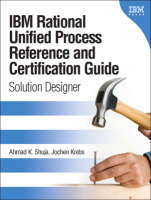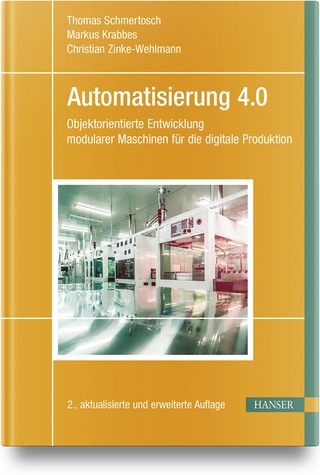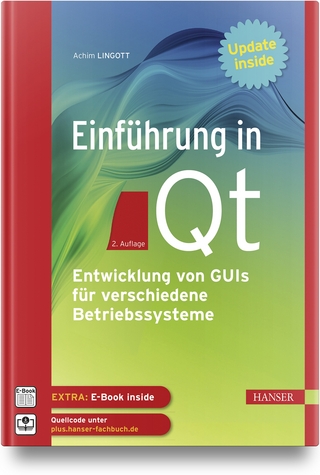
IBM Rational Unified Process Reference and Certification Guide
IBM Press (Verlag)
978-0-13-156292-9 (ISBN)
- Titel ist leider vergriffen;
keine Neuauflage - Artikel merken
The IBM® Rational Unified Process® has become the de facto industry-standard process for large-scale enterprise software development. The IBM Certified Solution Designer - IBM Rational Unified Process V7.0 certification provides a powerful way for solutions developers to demonstrate their proficiency with RUP.
The first and only official RUP certification guide, this book fully reflects the latest versions of the Rational Unified Process and of the IBM RUP exam. Authored by two leading RUP implementers, it draws on extensive contributions and careful reviews by the IBM RUP process leader and RUP certification manager.
This book covers every facet of RUP usage. It has been carefully organized to help you prepare for your exam quickly and efficiently--and to provide a handy, compact reference you can rely on for years to come.
Coverage includes
A full section on RUP exam preparation and a 52-question practice exam
Core RUP concepts, the new RUP process architecture, and key principles of business-driven development
RUP’s architecture-centric approach to iterative development: practical issues and scenarios
Patterns for successful RUP project implementation–and “anti-patterns” to avoid
The Unified Method Architecture (UMA): basic content and process elements
RUP content disciplines, in depth: Business Modeling, Requirements, Analysis and Design, Implementation, Test, Deployment, Project Management, Change and Configuration Management, and Environment
Essential RUP work products, roles, and tasks
RUP phases, activities, and milestones
RUP tailoring and tools for your organization--including introductions to IBM Rational Method Composer (RMC) and MyRUP
Ahmad K. Shuja, www.shuja.info, is an accomplished IT manager and professional who has worked at some of the major financial services (Citigroup Inc., Merrill Lynch & Co., and others) and management consulting organizations (Ernst & Young Inc. / Cap Gemini Ernst & Young Inc., and others) around the globe. He has a proven track record of successfully enabling organizations to build and manage high-quality, software-intensive products and services efficiently and effectively. Ahmad provides advisory and consulting services in IT strategy and planning, IT Service Management (ITSM) and governance, program and project management (PMO) transformation and operations, software engineering processes and agile software development (RUP, XP, SCRUM, and others), enterprise architecture, and business process management. In addition, he offers training and mentoring services across a wide range of IT disciplines. Ahmad holds the degrees Master of Science in Management of Technology from the Massachusetts Institute of Technology (MIT Sloan School of Management), Master of Science in Computation (Mathematics and Software Engineering) from the University of Oxford, and Master of Information Systems from the University of Toronto. He also holds numerous professional certifications, including Project Management Institute (PMI) Project Management Professional (PMP), Software Engineering Institute (SEI) Certificate in Capability Maturity Model Integration (CMMI), IT Infrastructure Library (ITIL) Service Manager (ITIL Master Certification), and Certified RUP Specialist, to name a few. Ahmad can be reached directly at ahmad@alum.mit.edu. Jochen (Joe) Krebs, www.jochenkrebs.com, is an active member of both the Agile Alliance and the Scrum Alliance. He also is a member of the Agile Project Leadership Network (APLN) and spearheads the local chapter in New York City. He is an IBM Certified Specialist — Rational Unified Process and an IBM Certified Solution Designer — Rational Unified Process 7.0. He is also a Certified ScrumMaster (CSM) and a Project Management Professional (PMP®). Joe frequently publishes articles with a focus on project management and requirements engineering, and he speaks at conferences and companies. He received his MSc in Computing for Commerce and Industry from the Open University and teaches regularly at New York University (NYU). In his current role, he is responsible for successful adoption of agile development practices in a large investment bank in New York City and provides agile mentoring services through www.incrementor.com. He is currently working on his new book, Agile Portfolio Management, to be released in 2008. Prior to taking on his current responsibilities, Joe co-developed the latest RUP certification examination and authored content for RUP using the Rational Method Composer. In addition, he contributed to the OpenUP project within the Eclipse foundation. Throughout his career, Joe has taught more than 1,000 professionals in the USA and Europe. The topics have included project management, requirements engineering, object-oriented analysis and design, Smalltalk, Java™, agile development processes, and the RUP.
Preface xx
About the Authors xxv
Part I Introduction
Chapter 1 Welcome to the IBM Rational Unified Process and Certification 3
Chapter 2 Key Principles for Business-Driven Development 33
Part II Unified Method Architecture (UMA)
Chapter 3 Basic Content Elements 63
Chapter 4 Basic Process Elements 71
Part III Rational Unified Process: Content and Process Elements
Disciplines
Chapter 5 Business Modeling 81
Chapter 6 Requirements 93
Chapter 7 Analysis and Design 111
Chapter 8 Implementation 131
Chapter 9 Test 141
Chapter 10 Deployment 157
Chapter 11 Configuration and Change Management 169
Chapter 12 Project Management 181
Chapter 13 Environment 199
Process
Chapter 14 Phases, Activities, and Milestones 209
Part IV Tailoring and Tooling
Chapter 15 Tailoring 229
Chapter 16 Tools 241
Part V Certification, Examination, and Practice
Chapter 17 The Value of RUP Certification 257
Chapter 18 Sample Examination 261
Chapter 19 Before, During, and After the Examination 271
Appendix Answers to Sample Questions 279
Index 289
| Erscheint lt. Verlag | 10.1.2008 |
|---|---|
| Verlagsort | Armonk |
| Sprache | englisch |
| Maße | 181 x 234 mm |
| Gewicht | 656 g |
| Themenwelt | Informatik ► Software Entwicklung ► Objektorientierung |
| ISBN-10 | 0-13-156292-4 / 0131562924 |
| ISBN-13 | 978-0-13-156292-9 / 9780131562929 |
| Zustand | Neuware |
| Haben Sie eine Frage zum Produkt? |
aus dem Bereich


